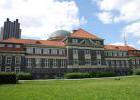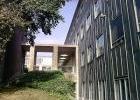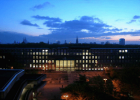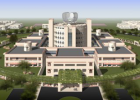張齡之
歐洲,荷蘭
企研所 張齡之
RSM Introduction
Rotterdam School of Management (RSM) is the business school that belongs to Erasmus University Rotterdam (EUR), located in Burgemeester Oudlaan 50 in Rotterdam, The Netherlands. It is one of Europe’s largest international business schools and has consistently been ranked amongst the top schools both internationally and in Europe. With its outstanding reputation, RSM caters to a diversity of students from different cultures and backgrounds and fosters business leaders for tomorrow worldwide.
In addition to the normal bachelors, masters, MBA, executive, and doctoral programs, RSM also offers exchange programs for students at a bachelors and masters level from its partner schools of more than 100 leading business schools and universities. These exchange programs give students the opportunity to enhance academic credentials, extend business experience abroad, gain cross-cultural skills, and develop an international network. Given its convenient location and unique experience and offerings, RSM is often a popular choice for exchange students from partner schools around the world.

Academics
The academic year at RSM is divided into three trimesters. For those enrolled in the Masters Exchange Program, there are two options to choose from: Fall and Spring. The Fall exchange program lasts from August through to December, which is equivalent to Trimester 1. The Spring exchange program lasts from January to June, spanning Trimester 2 and 3. Each trimester is again divided into two blocks in which
students are required to take different courses.
Over 45 different courses are available for master exchange students to select from. These courses are core courses that belong to RSM’s 11 different master programs, and are attended together with full-time students. The only exception is the International Business Project (IBP); which is the main element of the master’s exchange program. This is a project designed specifically for exchange students and a select group of Dutch students to work together on a unique consultancy assignment assigned by organizations.
The grading system adopted by RSM is the European Credit Transfer System (ECTS). In this system, 60 ECTS represents the workload of a full year of study. Moreover, 1 ECTS is equivalent to 28 hours of academic studies, which includes lectures, reading, preparation for exams, independent study, and writing of papers. Different courses weigh differently on ECTS. The most time consuming or demanding courses are 10 ECTS. Exchange students are required to have a minimum workload of 20 ECTS and a nonobligatory maximum of 30 ECTS in a trimester. Since a trimester is divided into two blocks, students are required to enroll for one or more courses from only one master program per block. Selecting two different courses from two different master programs or more is not possible.
Courses are assessed in various ways depending on the professor and range from written exams (multiple choice or open-ended questions), assignments, case studies, projects, and presentations. The grading scale is 1 to 10; with ’10’ indicating ‘Excellent’ and ‘1’ signifying ‘Very Poor’. The passing mark is 5.5. Final written exams usually take place during the end of each block. For those who do not pass the course can apply for a re-sit exam which is held a month after a trimester ends. The following paragraphs offer an insight into the 3 courses I took over the first trimester (fall exchange).
The Foundations of Entrepreneurship (8 ECTS)
The Foundations of Entrepreneurship is a course offered by the Entrepreneurship & New Business Venturing master program, and participation spans the first block. This core course offers insights into ‘Entrepreneurship’ from various scientific disciplines such as psychology, economics, geography and sociology. It introduces fundamental perspectives, concepts and discussions in the field of entrepreneurship and new business venturing. Specifically, this course focused on four main questions: (1) Who becomes an entrepreneur?; (2) How do entrepreneurs create new ventures?; (3) How do entrepreneurs make their ventures grow and what contributes to or explains their success?; and (4) How do entrepreneurs deal with or learn from firm exit or failure?
This course is organized into four modules, with each one addressing the contribution of one discipline (psychology, economics, geography and sociology). No textbooks were assigned for this course, but a virtual course pack made up of a number of articles, book chapters, and newspaper clippings are posted online for students to study. 2 to 4 articles (somewhere between 45 to 65 pages) are appointed for each class. Students were required to read these articles before each class and submit a one page answer to questions posted by the professor. Presence during class is mandatory and is registered. With respect to teaching style, the four professors responsible for this course all have different styles. Some like to lecture whilst others prefer to use discussion as a means of teaching.
The literature is examined through two exams touching upon the two of the four chosen disciplines in the field of entrepreneurship during and at the end of the trimester. Students get two separate grades for these exams, all together making up 80% of the final grade. The remaining 20% is based on the quantity and quality of the assignments, participation during class and presence. This course is not to be taken lightly as it is quite demanding and intensive.
Marketing Strategy (5 ECTS)
Marketing Strategy is a course offered by the Marketing Management master program during the second block of the first trimester. This course allows students to become familiar with and develop an in-depth understanding of the frameworks, concepts, models, and paradigms that collectively form the foundation for marketing strategy. Its main objective is to help students develop skills and the ability to apply this knowledge to strategic choices at a business level.
The course is taught with a blend of lectures and case discussions. During lectures, the professor presents and discusses marketing concepts, frameworks and theories. In preparation of and during the case discussions, students are required to analyze realistic problem situations in the form of business cases in the course literature. For case discussion classes, students work in groups of two to diagnose and analyze assigned cases. Three questions are posted online and must be answered and handed in before the actual case discussion with the professor begins.
Although not obligatory, class attendance is strongly recommended by the professor as some directions to exam questions may be provided through case discussions. The exam is a closed-book exam at the end of the trimester which covers all the materials discussed during lectures, case discussions and articles available in the course reader. Two components contribute to the course grade. Individual exam grade accounts for 75% of the total grade, and the group written case analysis accounts for the remaining 25%.
International Business Project (10 ECTS)
The International Business Project is a unique opportunity for graduate exchange students and a select group of Dutch students to solve a real-world management problem. It is a consultancy project whereby students collaborate with RSM’s corporate contacts and organizations over four months (spanning two blocks) to find solutions to assigned business problems. Client organizations range from large multinationals such as ABN AMRO, Heineken, ING, Kone, Philips and Shell, to medium sized companies or entrepreneurial firms. The projects can have a Human Resource, Marketing, Strategy or Logistics focus.
IBP teams are generally made up of five students; one Dutch student and four international exchange students. These teams are composed according to skills and competencies required by companies, and students’ preferences. In addition, an academic coach from RSM and an in-company coach from the client organization are assigned to each IBP. The academic coach helps students to focus their project topic and interfaces with the company’s representative to discuss the team’s progress and align expectations and conditions for the project. The company coach on the other hand, acts as a liaison between the team, RSM and the company. He or she assists teams by ensuring that the company provides enough access to information and necessary resources.
The International Business Project is structured in five stages. A kick-off lecture introduces students to the project, and information on companies assigned to each team is provided. In the second stage, teams are required to draft a project proposal that details research methods, time schedule and budgeting of resources needed. This is followed by the research phase whereby teams collect data by consulting secondary sources, conducting interviews and analyzing reports. Towards the end of the project, teams present their findings and recommendations to both the client companies, fellow students and a jury of consultants at RSM. In addition, a written consultancy report is submitted to the company and academic coach for evaluation. The project concludes with a reflection report from each student on team process, team effort, and individual learning experience.
Students spend approximately two days a week (minimum), depending on the nature of the assigned project, on the International Business Project. Each individual is graded both individually and as a team by the academic and company coach. Peer evaluation from each team member is also taken into consideration in the final grade.
Life in the Netherlands
Living in the Netherlands during the exchange program was a great experience for me. Here I will give a brief description of how life is like in the country, or how life is like for exchange students at RSM.
The majority of exchange students live in student housing provided by Studswonen (contact details provided by RSM). This housing agency owns quite a number of buildings near RSM campus; hence, it makes travelling to and from school more convenient. I stayed in the building known as ‘Casa Erasmus’, which is located right next to a tram stop called ‘Avenue Concordia’. Tram 21 frequently passes by every twenty minutes, and makes a direct connection to the school and city center. Casa Erasmus is a four story building, with a
great amount of fully furnished apartments. Each apartment is shared by two or three students. However, each student gets their own room; only the kitchen, toilet, and bathroom is shared. The room I stayed in was big enough for me (around 6 X 6 meters). It had all the necessary furniture in it, such as a bed (with sheets and covers), table, chairs, closet, bookshelf, drawer, internet cable, and lamps. 405 Euros per month for such an apartment at such an ideal location was a very good deal. Opposite Casa Erasmus is another student housing building called ‘International House’, which is a hundred or more Euros more expensive than Casa Erasmus. The rooms there can easily be double the size of the ones in my building; hence I consider their rooms to be too big for one person. However, since Casa Erasmus does not have its own laundry room, students staying there have to make weekly trips to the International House to do their laundry.
School is 15 minutes away by foot, 5 minutes away by bike, and 3 minutes away by tram from Avenue Concordia. Most of my classes took place in the T and C buildings on campus. For classes that are more than 2 hours, there is usually a break time in between, depending on the professor. During these breaks, students visit the student cafés or snack-shops to quickly grab a bite of sandwich or just have coffee. All the resources that are necessary for students are made easily available on campus. The library, gym, computer lab, printers, and student shops are all located in convenient distance to each other.
The most common method of transport in The Netherlands is by bicycle. These can be seen throughout the city: parked next to a lamp post, on the road, or even parked by a tree. Not only does using bicycles make traveling around the city more convenient, it also makes it cheaper (as transportation costs are extremely expensive). For example, taking a tram and getting off only after 3 stops would cost around €0.85.
With respect to the food and living expenses in The Netherlands, I personally do not think that it is too high compared to that of Taiwan. It is more or less the same, given that you cook at home of course. Grocery shopping can be done at ‘Albert Heijn’, a chain supermarket that can be found throughout the country. The closest Albert Heijn to me was at the metro or tram stop ‘Oostplein’. Another good option is to do grocery shopping at ‘Plus’, a smaller chain store compared to Albert Heijn, but also located in convenient distance to the school. In my opinion, grocery or food expenses can be controlled at €20 a week. This can get one more than satisfied! The cheapest produces are dairy products (compared to Taiwan); for example, a liter of
milk only costs €0.85, which is equivalent to less than 40 NT Dollars. However, meats and vegetables may be a little more expansive than the prices we are accustomed to in Taiwan. Lastly, there is a Chinese supermarket near the Rotterdam Central Station called ‘Wah Nam Hong’. Here, Chinese delicacies such as dumplings, hot pot ingredients, instant noodles, vegetables, and all the things that are not available in Western stores can be found. It is a good option to go there if one misses the taste of home.
Dutch Culture
The Dutch are extremely friendly people, but at times, they may seem to be rude to those who come from a ‘closed’ culture. That is, the Dutch are very straightforward and direct; they do not like to like to pretend for others or themselves. For example, if they do not like something or are unhappy about something, they would say it. This may be quite a cultural shock for those who are not used to this sort of communication style.
Eating with the Dutch may also be quite an interesting experience. Food is not a big attraction in The Netherlands. This does not mean that the Dutch do not have good food; it just means that they are not that specialized in food like other countries such as Italy and Spain. This can be seen in their daily meals. Breakfast is usually bread
with cheese and ham. Lunch, which is different from what we are used to, is normally a short activity with a quick bite of the sandwich that can be finished in 15 minutes. Dinner consists of more plates, but these are normally prepared in the Western style. Nevertheless, there are many delicious Dutch snacks such as stroopwafels, poffertjes, bitterballen and kroketten.
I am sure that we are all well aware of the drinking culture in Europe. The beer culture is reflected amongst the Dutch lifestyle, where people enjoy sitting in bars or cafés in the afternoon or at night to enjoy a drink or two with their friends. Dutch beer brands include Heineken, Amstel and Grolsch, which are well known for their taste around the world. However, for those who do not enjoy the taste of alcohol, there is an option for drinking coffee. Coffee is also a popular beverage amongst individuals of all ages.
Things to Keep in Mind
The most important matter of concern is the different Visas necessary for staying in The Netherlands and traveling in the EU. Before the EU Visa exemption (January 2011), exchange students from Taiwan had to apply for the ‘D-Type’ Visa. This Visa, along with its ‘multiple entry’ allowed Taiwanese students to travel and stay in The Netherlands for as long as it was valid. Upon arrival in the country, students have to apply for the ‘Temporary Residence Permit’, otherwise known as the ‘MVV’. The school assists in this application with the IND (the Dutch immigrations office). Note that exchange students must have the necessary documents and valid passport photos; otherwise application may be more costly and difficult.
Once registered at RSM, it is best to open a student account at the ING bank. The school will give students advice and directions on this matter. The ING bank is a convenient place to store your allowances; the only problem is that their ATM machines are in Dutch. It is quite hard at the beginning to understand the operation of these machines, but it will get easier once you get used to it. Going directly to an ING bank and asking for help is always the best option if you have any problems. Cash can be withdrawn from any ATM machines available and makes shopping easy. However, almost all the shops in The Netherlands take debit cards. Hence, you can shop without carrying cash on you. In this case, purchasing an item only requires you to swipe your ING debit card (Maestro Card).
Lastly, and most importantly, for those exchange students in the future, it is best to be safe while you are abroad. Running into accidents or getting sick may result in huge health expenses. Hospitals in The Netherlands are not frequently found, except for big ones. Clinics on the other hand are not popular at all. Pharmacies would be the least costly options to go to if you have minor injuries or illnesses.








